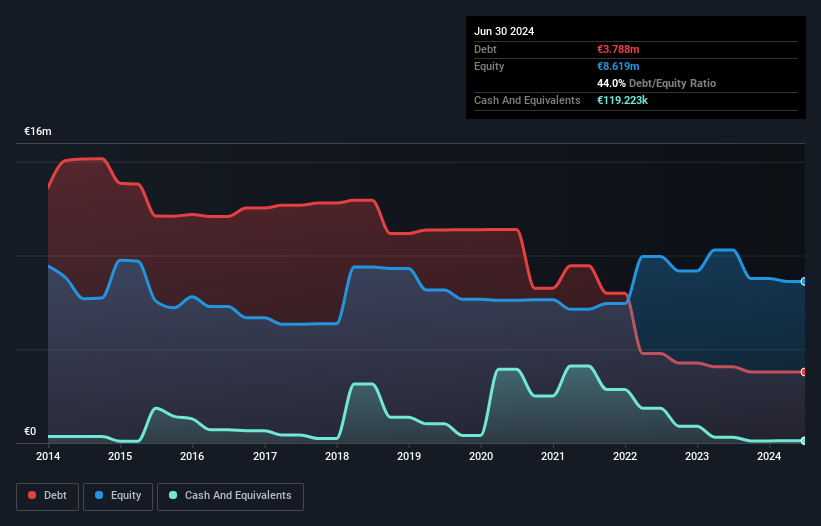
Some say volatility, rather than debt, is the best way to think about risk as an investor, but Warren Buffett famously said that 'Volatility is far from synonymous with risk.' So it seems the smart money knows that debt - which is usually involved in bankruptcies - is a very important factor, when you assess how risky a company is. As with many other companies Proodeftiki S.A. (ATH:PRD) makes use of debt. But the real question is whether this debt is making the company risky.
Why Does Debt Bring Risk?
Debt assists a business until the business has trouble paying it off, either with new capital or with free cash flow. In the worst case scenario, a company can go bankrupt if it cannot pay its creditors. While that is not too common, we often do see indebted companies permanently diluting shareholders because lenders force them to raise capital at a distressed price. Of course, the upside of debt is that it often represents cheap capital, especially when it replaces dilution in a company with the ability to reinvest at high rates of return. When we examine debt levels, we first consider both cash and debt levels, together.
Check out our latest analysis for Proodeftiki
What Is Proodeftiki's Net Debt?
As you can see below, Proodeftiki had €3.79m of debt at June 2024, down from €4.07m a year prior. On the flip side, it has €119.2k in cash leading to net debt of about €3.67m.

How Strong Is Proodeftiki's Balance Sheet?
Zooming in on the latest balance sheet data, we can see that Proodeftiki had liabilities of €5.07m due within 12 months and liabilities of €3.98m due beyond that. Offsetting this, it had €119.2k in cash and €7.33m in receivables that were due within 12 months. So it has liabilities totalling €1.60m more than its cash and near-term receivables, combined.
This deficit isn't so bad because Proodeftiki is worth €5.89m, and thus could probably raise enough capital to shore up its balance sheet, if the need arose. But it's clear that we should definitely closely examine whether it can manage its debt without dilution. There's no doubt that we learn most about debt from the balance sheet. But you can't view debt in total isolation; since Proodeftiki will need earnings to service that debt. So when considering debt, it's definitely worth looking at the earnings trend. Click here for an interactive snapshot.
It seems likely shareholders hope that Proodeftiki can significantly advance the business plan before too long, because it doesn't have any significant revenue at the moment.
Caveat Emptor
Importantly, Proodeftiki had an earnings before interest and tax (EBIT) loss over the last year. Indeed, it lost €230k at the EBIT level. When we look at that and recall the liabilities on its balance sheet, relative to cash, it seems unwise to us for the company to have any debt. Quite frankly we think the balance sheet is far from match-fit, although it could be improved with time. Another cause for caution is that is bled €37k in negative free cash flow over the last twelve months. So suffice it to say we do consider the stock to be risky. When analysing debt levels, the balance sheet is the obvious place to start. However, not all investment risk resides within the balance sheet - far from it. For example - Proodeftiki has 3 warning signs we think you should be aware of.
At the end of the day, it's often better to focus on companies that are free from net debt. You can access our special list of such companies (all with a track record of profit growth). It's free.
New: Manage All Your Stock Portfolios in One Place
We've created the ultimate portfolio companion for stock investors, and it's free.
• Connect an unlimited number of Portfolios and see your total in one currency
• Be alerted to new Warning Signs or Risks via email or mobile
• Track the Fair Value of your stocks
Have feedback on this article? Concerned about the content? Get in touch with us directly. Alternatively, email editorial-team (at) simplywallst.com.
This article by Simply Wall St is general in nature. We provide commentary based on historical data and analyst forecasts only using an unbiased methodology and our articles are not intended to be financial advice. It does not constitute a recommendation to buy or sell any stock, and does not take account of your objectives, or your financial situation. We aim to bring you long-term focused analysis driven by fundamental data. Note that our analysis may not factor in the latest price-sensitive company announcements or qualitative material. Simply Wall St has no position in any stocks mentioned.
About ATSE:PRD
Proodeftiki
Operates as a civil engineering and general construction company.
Slight with mediocre balance sheet.
Market Insights
Community Narratives


